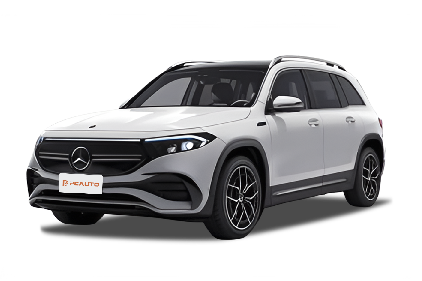Q
What are the trim levels for the EQB 2022?
The 2022 Mercedes-Benz EQB is available in Malaysia with two primary trim options: the EQB 250+ and the EQB 350 4MATIC. The EQB 250+ serves as the entry point, packing a single front-mounted electric motor that delivers 190 horsepower. It offers a claimed WLTP range of 423 kilometers. Standard kit here includes the 10.25-inch dual-screen setup, MBUX infotainment system, panoramic sunroof, and a suite of active safety features.
Stepping up to the EQB 350 4MATIC brings a dual-motor all-wheel-drive configuration, bumping power output to a healthy 292 horsepower. Range takes a slight hit, coming in at 419 km WLTP, but you gain the sportier AMG Line package, adaptive suspension, and other upgrades, making it the pick for those who value performance.
Both variants support 110kW DC fast charging, which can take the battery from 10% to 80% in around 32 minutes. Positioned as a compact electric SUV in Mercedes' EQ lineup, the EQB's main rivals in Malaysia include the BMW iX1 and Volvo XC40 Recharge. A key advantage for the EQB is its availability with an optional third row, offering seven seats and adding a practical family-friendly dimension.
It's worth highlighting that electric vehicles in Malaysia benefit from import duty and sales tax exemptions, which significantly boost the EQB's value proposition. However, real-world range might dip slightly below the claimed figures due to Malaysia's hot climate. If you're considering one, we'd strongly recommend a test drive to experience both charging convenience and how the air conditioning affects overall energy consumption.
Special Disclaimer: This content is published by users and does not represent the views or position of PCauto.
Related Q&A
Q
What is the range of the EQB 2022?
The 2022 Mercedes-Benz EQB offers an electric range of approximately 419 kilometers in the Malaysian market, based on the WLTP standard. Of course, your actual mileage may vary depending on driving habits, road conditions, and weather. Under the hood, it's packing a 66.5kWh battery pack that supports 100kW fast charging – you can juice it up from 10% to 80% in about 32 minutes, making it a solid choice for both city commutes around Malaysia or even those occasional interstate jaunts.
For folks considering making the switch to electric, range is definitely a key factor, but don't sleep on charging convenience. Malaysia's major cities are steadily ramping up their charging infrastructure, and that includes Mercedes' own Mercedes me Charge network, which hooks you up with access to multiple charging brands.
As a 7-seater electric SUV, the EQB strikes a nice balance between practicality and eco-friendliness. It sips electricity at a rate of around 18.5kWh per 100km, which translates to significantly lower running costs compared to a petrol-powered equivalent. Plus, EVs in Malaysia still benefit from incentives like import tax exemptions, making them a more economical choice in the long run.
If you're someone who frequently hits the highway for longer trips, a little pre-planning goes a long way – there are now more fast-charging stations popping up along major routes like the North-South Expressway. And let's not forget we're in the tropics – keeping an eye on battery health means avoiding leaving it baking in the scorching sun for extended periods.
Q
How big is the EQB 2022?
The 2022 Mercedes-Benz EQB is a compact seven-seater electric SUV, measuring 4684mm in length, 1834mm in width, and 1706mm in height, with a wheelbase stretching to 2829mm. This size strikes a nice balance—nimble enough to navigate Malaysia's city streets while still offering plenty of room for passengers, making it a solid pick for families. Cargo space is practical too: 495 liters with the rear seats up, and a generous 1710 liters when you fold them down, which handles everything from daily grocery runs to weekend getaways with ease.
For Malaysian buyers, the EQB's electric powertrain isn't just eco-friendly; it also fits well with the country's growing charging infrastructure. With an NEDC range of around 419km, it's more than capable of handling longer trips, say from Kuala Lumpur to Penang, without range anxiety kicking in.
And true to Mercedes form, the EQB doesn't skimp on luxury. The interior uses high-quality materials, and those twin 10.25-inch displays add a tech-forward vibe. Little touches like the inclusion of Type-C charging ports (super common here) and wireless CarPlay show that Mercedes really thought about what Malaysian drivers actually need day-to-day.
Q
How much is the Mercedes EQB 2022?
The 2022 Mercedes-Benz EQB starts at approximately RM278,888 in the Malaysian market, with the exact price varying depending on the chosen trim level and optional extras. As a pure electric SUV under Mercedes' EQ lineup, the EQB is offered in two variants: the EQB 250 and the EQB 350 4MATIC, each equipped with electric motors of different power outputs. It boasts a driving range of around 423 kilometers based on the WLTP cycle, making it a solid pick for consumers who want to blend luxury with eco-friendliness.
The Malaysian government offers certain tax incentives for electric vehicles, such as exemptions on import duties and sales tax, which help to bring down the overall purchase cost of the EQB somewhat. Beyond that, the EQB comes loaded with features like the MBUX intelligent infotainment system, a panoramic sunroof, and advanced driver assistance functions, really showcasing Mercedes' technological prowess in the electric mobility space.
For those considering an EV, besides price, the convenience of charging infrastructure is another key factor. Major cities in Malaysia already have a decent number of charging stations, and Mercedes also provides installation services for home wallboxes, further enhancing the overall ownership experience.
Q
What is the range of the Mercedes EQB 2022?
The 2022 Mercedes-Benz EQB offers an approximate all-electric range of 419 kilometers in the Malaysian market, based on the WLTP standard. Of course, your actual mileage may vary depending on driving habits, road conditions, and weather. Powering the EQB is a 66.5 kWh lithium-ion battery pack, which supports 100 kW DC fast charging. This means you can get from 10% to 80% charge in around 30 minutes – perfect for those daily commutes around Malaysian cities or even a quick weekend getaway.
As part of the Mercedes-EQ family, the EQB carries forward that signature Mercedes-Benz luxury feel. One standout feature is the availability of a 7-seat configuration, which is pretty rare in this segment of electric SUVs. Good news for folks here: the EQB handles Malaysia's tropical climate surprisingly well, with minimal impact on battery performance. So, you won't have to lose sleep over excessive battery degradation due to the heat.
It also comes with an intelligent energy recovery system, which helps squeeze out even more range by recapturing kinetic energy. If you're a Malaysian consumer thinking about making the switch to electric, besides just looking at the range figures, it's worth checking out the local charging infrastructure. The good news is that major cities in Malaysia are steadily improving their charging networks, and Mercedes has also rolled out exclusive charging services at some of their dealerships.
Popular Cars
Model Year
Car Compare
Car Photo
Latest Q&A
Q
Do spark plugs degrade over time?
Spark plugs do age gradually over time, and their performance degradation is mainly influenced by a combination of material, engine operating conditions, and usage environment. As a basic type, nickel alloy spark plugs are recommended to be inspected and replaced every 20,000 kilometers. Platinum and iridium spark plugs, due to their excellent corrosion resistance, can last 50,000 to 80,000 kilometers, while ruthenium spark plugs can even reach 150,000 kilometers. Turbocharged engines, due to their high-temperature and high-pressure environment, accelerate electrode wear, requiring the replacement interval to be shortened to about 60% of that for ordinary models. If the vehicle experiences difficulty starting in cold conditions, lacks acceleration power, or shows abnormally increased fuel consumption, it may be caused by enlarged electrode gaps or carbon deposits on the spark plug insulators, necessitating immediate inspection and repair. It is worth noting that even if the mileage threshold is not reached, spark plugs will exhibit decreased ignition efficiency due to metal oxidation after three years of installation. It is recommended to dynamically adjust the maintenance plan based on the service manual and actual vehicle conditions. Regularly using a specialized gap gauge to check the electrode gap (typically 0.7-1.1mm) and avoiding low-quality fuel can effectively extend spark plug service life.
Q
Will my car run better with new spark plugs?
Replacing spark plugs can indeed make a vehicle run more smoothly and improve overall performance. New spark plugs ensure more complete ignition, increasing fuel combustion efficiency, thereby enhancing power output and reducing fuel consumption—typically saving about 5% to 10% of fuel. Worn spark plugs can cause difficulty in starting, reduced power, and increased exhaust emissions, while new ones improve cold-start performance, reduce engine vibration, protect the three-way catalytic converter, and extend engine life.
It is recommended to determine the replacement interval based on the material: ordinary nickel alloy spark plugs should be replaced every 20,000 kilometers, platinum spark plugs approximately every 40,000 kilometers, and iridium spark plugs can last 60,000 to 80,000 kilometers. Specific intervals should be referenced from the vehicle manual. Additionally, matching the OEM heat range specification is crucial: high-compression-ratio engines require cold-type spark plugs (high heat range), while low-compression-ratio engines are suitable for hot-type spark plugs (low heat range). Incorrect selection may lead to knocking or carbon buildup.
When replacing spark plugs yourself, ensure the spark plug holes are cleaned to prevent debris from entering the cylinders, and tighten them to the specified torque—over-tightening may damage the cylinder head threads. If the vehicle exhibits symptoms like sluggish acceleration, rough idling, or abnormally high fuel consumption, the spark plug condition should be inspected promptly.
Q
What are the signs of bad spark plugs?
Spark plug malfunctions can affect vehicle performance through various obvious symptoms, mainly manifesting as difficulty starting (multiple attempts required for both hot and cold starts), abnormal engine vibration at idle and during driving, a noticeable reduction in power output, an abnormal increase in fuel consumption, and unexplained stalling while driving. The core causes of these issues include electrode carbon deposits leading to short-circuit and spark failure, improper spark plug gaps (too small limits spark intensity, too large results in insufficient voltage), insulator cracks causing leakage, or electrode detachment due to long-term electrical erosion. When the insulation resistance value of the spark plug decreases, the ignition voltage will be weakened or even completely fail. In addition, short-circuiting of high-voltage lines or erosion of platinum contacts may also cause single-cylinder or multi-cylinder misfires. It is recommended to replace spark plugs regularly every 40,000 to 60,000 kilometers, but the specific interval should refer to the vehicle manual, as material differences (such as nickel alloy for 20,000 kilometers, iridium for 60,000-80,000 kilometers) will also affect their lifespan. If excessive exhaust emissions (such as black smoke) or acceleration hesitation are detected, the spark plug condition should be checked immediately to avoid derivative problems such as three-way catalytic converter damage caused by prolonged malfunctions. During replacement, ensure debris is cleaned from the installation holes and high-voltage lines are correctly connected according to the ignition sequence to maintain cylinder balance.
Q
Can spark plugs affect gas mileage?
Spark plugs do have a significant impact on fuel economy, and their performance status is directly related to the combustion efficiency of the engine. When the spark plug electrodes are worn or carbon-fouled due to long-term use, the ignition energy will weaken, leading to incomplete combustion of the air-fuel mixture. At this point, the ECU will compensate for the power loss by increasing the fuel injection volume, and fuel consumption may rise by 15% to 20%. The spark plug gap is also a key factor; the standard gap is typically 0.8-1.1 millimeters. A gap that is too large will result in insufficient ignition voltage, while a gap that is too small will impede flame kernel propagation. Both scenarios will reduce thermal efficiency. The replacement intervals for spark plugs made of different materials vary significantly: nickel alloy spark plugs are recommended to be replaced every 30,000 kilometers, platinum ones can last up to 60,000 kilometers, and iridium spark plugs can maintain performance for 80,000-100,000 kilometers due to their higher melting point. It is worth noting that heat range matching is equally important. If a cold-type spark plug with excessive heat dissipation is used, it is prone to carbon buildup under low-temperature conditions; conversely, hot-type spark plugs may cause pre-ignition in high-temperature environments. It is recommended that vehicle owners adhere to the manufacturer's maintenance schedule and select premium spark plugs that meet the heat range specifications and carry MS 828 certification. This approach not only optimizes fuel efficiency but also extends the oxygen sensor's lifespan, achieving overall fuel cost savings of approximately 5%-8%.
Q
How do I know if my spark plugs need replacing?
To determine whether spark plugs need replacement, the following signs and criteria can be used: When a vehicle experiences difficulty starting, rough idling, weak acceleration, or an abnormal increase in fuel consumption, it may be due to aging spark plugs causing reduced ignition efficiency. During disassembly and inspection, the electrode condition should be observed; if the tip shows severe erosion, carbon buildup, or the electrode gap exceeds 0.8mm (the standard value for ordinary nickel alloy spark plugs), immediate replacement is required. Spark plugs of different materials have significantly different lifespans: nickel alloy spark plugs are recommended to be replaced every 20,000 kilometers, while platinum and iridium spark plugs can last 40,000 kilometers and 60,000-80,000 kilometers respectively. It is worth noting that prolonged short-distance driving or frequent start-stop cycles will accelerate spark plug wear, and in such cases, replacement should be performed 20% earlier than the recommended mileage. When selecting replacement parts, the original equipment manufacturer's heat range specifications must be strictly matched. Common brands such as NGK or Bosch provide vehicle-specific cross-reference tables in their product catalogs; incorrect heat ranges can lead to engine knocking or carbon buildup issues. During installation, a torque wrench should be used to tighten to the specification of 15-20N·m; over-tightening may damage the cylinder head threads, resulting in repair costs as high as 300-500 Malaysian Ringgit.
View MoreRelated News

Mercedes-Benz halts the launch of L3-level autonomous driving, reverting to L2+ level
LienJan 16, 2026

Nvidia Announces Mercedes-Benz CLA as the First Vehicle with DRIVE AV Autonomous Driving Technology
MichaelJan 12, 2026

Brand New Mercedes-Benz GLC with EQ Technology Coming Soon: A Larger, Faster, and More Efficient Luxury All-Electric SUV
LienDec 11, 2025

Mercedes-Benz GLC200 4Matic debuts, offering a more accessible entry price at RM329,888
LienDec 11, 2025

Mercedes-Benz invests in an autonomous driving technology company under Geely named Qianli
AshleySep 25, 2025
View More












Pros
Cons